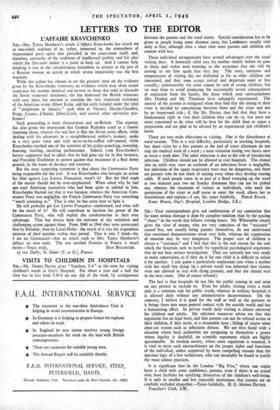VISITS TO CHILDREN IN HOSPITALS
Slit,—Mr. Monro Davies gives "Sundays, 2-4" as the time for visiting children's wards at Guy's Hospital. ' For about a year and a half the time has in fact been 5.30-6 on any day of the week, by arrangement between the parents and the ward sisters. Special consideration has to be given to people living some distance away, but Londoners usually visit daily at first, although after a short time most parents and children are content with less.
These individual arrangements have several advantages over the usual visiting days. A homesick child sees his mother shortly before he goes to sleep, and wakes next morning to the assurance that she will be coming to see him again' that very day. The tears, tantrums and temperatures of visiting day are abolished as far as older Children are concerned, and they soon accept arrival and departure more of less casually ; unfortimately the same cannot be said of young children, but we may hope to avoid producing the occasionally- severe consequences of separation from the family, like- those which your correspondents Mrs. Dunlop and Mr. Thornton have unhappily experienced. The anxiety of the parents is mitigated when they find that the timing of their visits is decided by consultation between them and the sister- and not by an impersonal rule ; if, like Mr. Davies, they feel that they have a fundamental right to visit their children they can do so, but most are more concerned to do what will be best for the child than to argue a proposition and are glad to be advised by an experienced sick children's
nurse. .
There are two main objections to visiting. One is the disturbance of ward routine. This is a real difficulty, particularly in teaching hospitals, but short visits by a few parents at the end of every afternoon do not stop the medical work of a ward ; a mass visitation lasting two hours once or twice a week does. The other objection is due to the risk of introducing infection. Children should not be allowed to.visit hospitals. The chance that an adult•may start an outbreak of an infectious fever is negligible, but infections of the upper respiratory tract may be dangerous, and there are parents who do not think of staying away when they develop roaring colds. If such people come in as part of a flood sweeping up the ward at two minutes past two on Sunday afternoon they can not be piCked out, whereas the treatment of visitors as individuals, who need the permission of the sister or staff nurse to enter the ward, allows her to discriminate and explain.—I am, Sir, yours faithfully, PHILIP EVANS.
Keats House, Guy's Hospital, London Bridge, S.E.r.






































 Previous page
Previous page